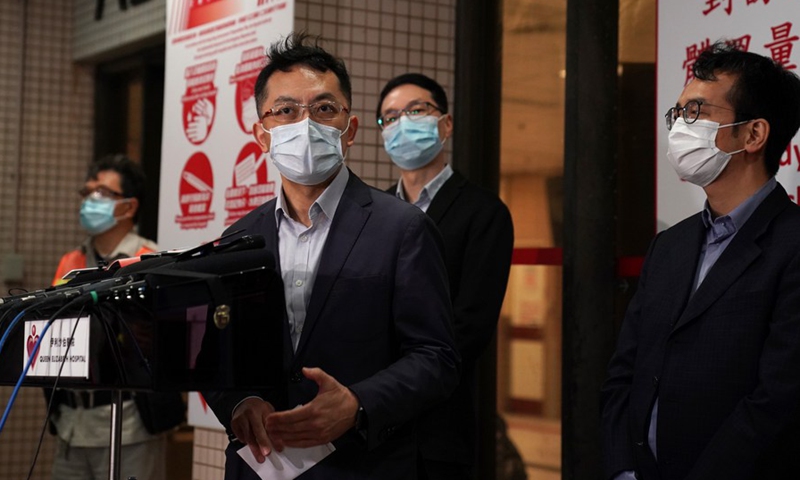
Ronald Lam (3rd R), controller of the Center for Health Protection of Hong Kong, speaks at a press briefing at Queen Elizabeth Hospital on March 3, 2021, Hong Kong, south China.(Photo: Xinhua)
The death of a Hong Kong resident who received the Sinovac COVID-19 vaccine is not directly linked to the vaccine, Hong Kong experts announced based on autopsy results, and Hong Kong's vaccination program will continue as planned.
At a press conference on Wednesday evening, Hung Fan Ngai Ivan, the convener of the committee assessing clinical events related to vaccines in Hong Kong, said committee members have concluded that the death was not directly related to the injections as autopsy results show that the man had serious chronic diseases, including "central obesity" - rounder stomach - and high blood pressure, and was suspected of having coronary heart disease.
According to Hung, the man, 63, very likely died of heart disease, which caused myocardial infarction, pulmonary edema and respiratory failure. A detailed autopsy report will follow later, Hung said, noting that the vaccination plan in the city would continue as planned as no evidence shows the individual case was related to vaccination.
Experts at the press conference suggest that Hong Kong residents with serious chronic diseases to see medical advice before accepting vaccines.
Yin Weidong, CEO of Chinese vaccine producer Sinovac Biotech, told the Global Times on Wednesday that "We are confident in the overall safety of the Sinovac vaccine as it was proven to be safe from observations of mass vaccinations."
The Department of Health in Hong Kong said on Tuesday night that the 63-year-old man developed shortness of breath two days after vaccination and was admitted to the hospital for treatment, but passed away on the same day.
According to Hong Kong media outlet hk01.com, the deceased man had chronic bronchitis, and no side effects related to the vaccine were observed during rescue efforts at the hospital.
Ronald Lam Man-kin, Controller of the Centre for Health Protection of the Department of Health, said Tuesday that the Hong Kong government approved the emergency use of the vaccine after assessment. It is safe and effective, the benefits outweigh the risks, and the vaccination program will continue, Lam said, according to hk01.com.
Lam said that people with serious and uncontrolled chronic illness or those who have an allergic reaction to vaccines should not receive COVID-19 vaccine.
Guo Weimin, spokesperson of the fourth annual session of the 13th Chinese People's Political Consultative Conference National Committee, noted at a press conference on Wednesday that Chinese vaccine producers follow strict standards and procedures at every step of vaccine development.
By the end of February, 5.2 million doses of Chinese vaccines had been administered in China. Some leaders of other countries have also taken the lead in accepting Chinese vaccines, which have demonstrated the safety and efficacy of the Chinese vaccines, Guo said.
Feng Duojia, president of the China Vaccine Industry Association, told the Global Times on Wednesday that it's very unlikely the death was linked to the Sinovac vaccine, and the death after vaccination was a coincidence.
Feng said that Hong Kong's vaccine campaign will not be affected by the incident.
He said that taking the Sinovac vaccine will not result in death, but certain groups of people such as pregnant women and those suffering acute fever, infection and immune deficiency are not recommended to receive vaccines.
Tong Kai Sing, vice president of the Association of Licentiates of Medical Council of Hong Kong, agreed with Feng and blamed some Hong Kong media for sensationalizing the issue to catch public attention.
"Normally, vaccines are very safe, and death would only occur when the injection causes serious allergic reactions. But serious side effects would occur within 15 minutes after injection, and it is very unlikely that death on the following day is caused by the injection," Tong explained.
Tao Lina, a Shanghai-based medical expert on vaccines, also believes that the incident was a coincidence and not caused by the vaccine.
Tao told the Global Times that mRNA COVID-19 vaccines are more likely to have severe side effects than inactivated ones such as the Sinovac vaccine.
Yang Zhanqiu, a virologist at Wuhan University, said earlier that unlike inactivated vaccines, the use of mRNA-based vaccines carries the risk of causing abnormal immune dysfunction and allergy or aggravating the underlying disease, which may eventually lead to death.
Experts said that inactivated vaccine technology is very mature and has undergone decades of clinical testing.
The first batch of Pfizer vaccines is expected to arrive in Hong Kong later this month.
Hong Kong authorities allow local residents to choose which vaccine they would accept. Yin told media Wednesday that recipients can make a choice based on their personal situation: people who face high infection risks can choose the one with higher protection rate, while those who face low risks can choose the vaccine with better safety.
Dozens of death incidents involving the Pfizer COVID-19 vaccine have been reported in countries including Norway and Spain. In the most recent example, a Japanese woman in her 60s died after receiving the Pfizer vaccine, Japanese health authorities said on Tuesday.
The cause of death is believed to be subarachnoid hemorrhage, and the causal relationship with the vaccine is indeterminable, the Japan Times quoted the health authority as saying.
More than 52 million doses of Chinese inactivated vaccines have been administered in China as of the end of February, and Chinese vaccines have been provided to 53 countries, with no severe side effects recorded.




